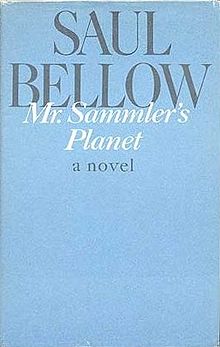- Mr. Sammler's Planet
-
Mr. Sammler's Planet is a 1970 novel by the American author Saul Bellow. It was awarded the National Book Award for fiction in 1971.
Contents
Plot synopsis
Mr. Artur Sammler, Holocaust survivor, intellectual, and occasional lecturer at Columbia University in 1960s New York City, is a “registrar of madness,” a refined and civilized being caught among people crazy with the promises of the future (moon landings, endless possibilities). “Sorry for all and sore at heart,” he observes how greater luxury and leisure have only led to more human suffering.
To Mr. Sammler—who by the end of the novel has found the compassionate consciousness necessary to bridge the gap between himself and his fellow beings—a good life is one in which a person does what is “required of him.” To know and to meet the “terms of the contract” was as true a life as one could live.
Literary significance and criticism
Though some critics have pigeonholed the novel as a response to the Holocaust[1] or as a Jeremiad against 1960s social mores[2] — and it is true that Sammler is horrified by those mores because, as Philip Roth pointed out, he views them as "the betrayal by the crazy species of the civilized ideal"[3] — others have noted that the novel revolves, as does Herzog, around Sammler's conflicts between intellect and intuition, between acting in the world and standing aside to observe it.[4] In a slowly building epiphany at the novel's end, Sammler finds a balance; Joyce Carol Oates wrote that she admired "the conclusion of Mr. Sammler's Planet, which is so powerful that it forces us to immediately reread the entire novel, because we have been altered in the process of reading it and are now, at its conclusion, ready to begin reading it."[5] At the conclusion, Sammler speaks to God. Referring either to the existence of objective moral truths or to the existence of God Himself, he says: "For that is the truth of it--that we all know, God, that we know, that we know, we know, we know."[6] In a lecture a few years later, asked to explain those lines, Bellow said this: "You read the New Testament and the assumption Jesus makes continually is that people know the difference immediately between good and evil... And that is in part what faith means. It doesn't even require discussion. It means that there is an implicit knowledge -- very ancient if not eternal -- which human beings really share and that if they based their relationships on that knowledge existence could be transformed."[7]
External links
- Profile of Saul Bellow at the Nobel Prize website
- Saul Bellow Society
Notes
- ^ Dittmar, The end of enlightenment: Bellow's universal view of the Holocaust in "Sammler's Planet"
- ^ Cambridge History of American Literature, p.256
- ^ Roth, Rereading Saul Bellow
- ^ Pifer, Saul Bellow against the Grain, p.11
- ^ Oates, Whose Side Are You On
- ^ Bellow, Mr. Sammler's Planet, page 313
- ^ as quoted in Pifer, op.cit., p.7
Works by Saul Bellow Novels and Novellas: Dangling Man • The Victim • The Adventures of Augie March • Seize the Day • Henderson the Rain King • Herzog • Mr. Sammler's Planet • Humboldt's Gift • The Dean's December • More Die of Heartbreak • A Theft • The Bellarosa Connection • The Actual • Ravelstein
Short stories : "Looking for Mr. Green" · "The Gonzaga Manuscripts" · "A Father-To-Be" · "Leaving the Yellow House" · "The Old System" · "Mosby's Memoirs" · "Zetland: By a Character Witness" · "A Silver Dish" · "Him with His Foot in His Mouth" · "Cousins" · "What Kind of Day Did You Have?" · "By the St. Lawrence" · "Something to Remember Me By"
Short story collections : Mosby's Memoirs and Other Stories • Him with His Foot in His Mouth and Other Stories • Something to Remember Me By: Three Tales • Collected Stories
Non-fiction: To Jerusalem and Back • It All Adds Up
Bibliography of Saul Bellow Categories:- 1970 novels
- Jewish literature
- Novels by Saul Bellow
- Novels set in New York City
- Works originally published in The Atlantic (magazine)
Wikimedia Foundation. 2010.

